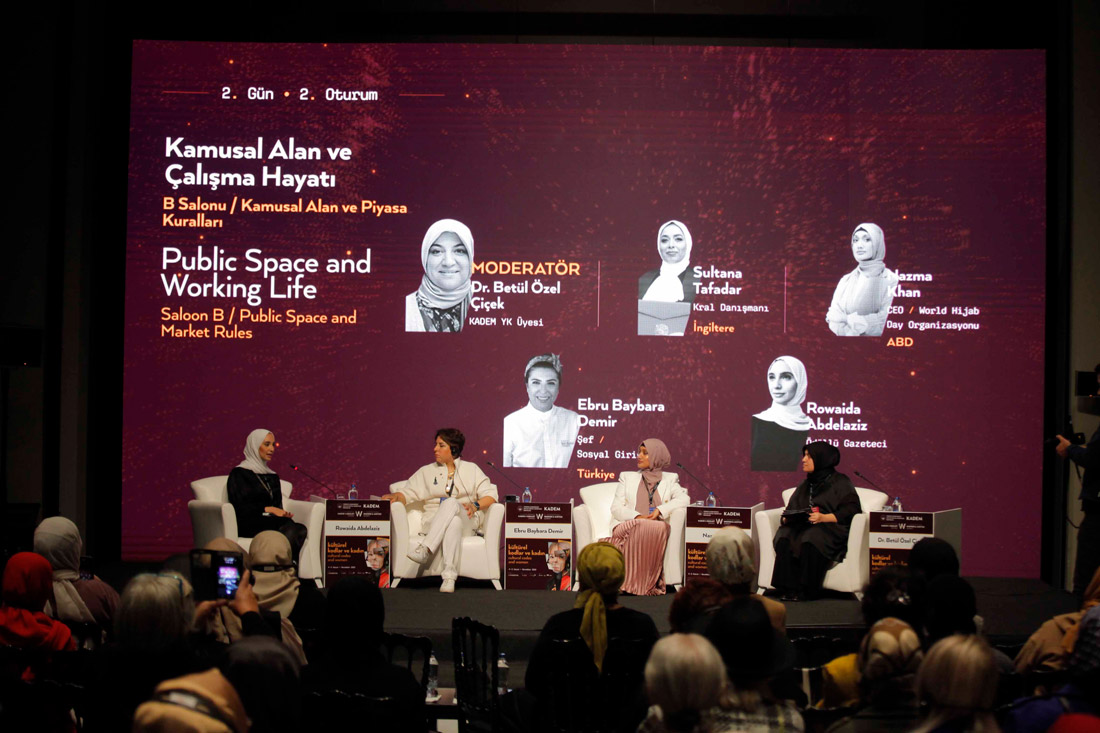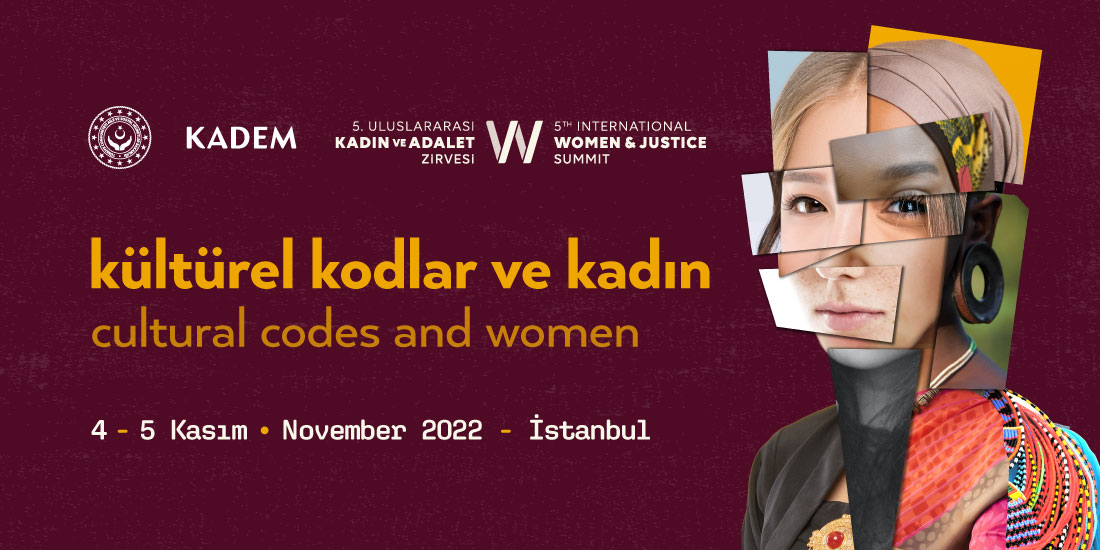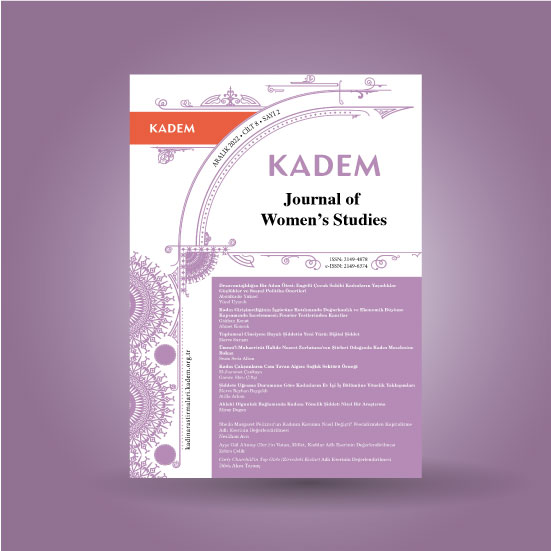5th International Women and Justice Summit Held on November 4-5
The impact of cultural codes and norms on women’s lives was discussed at the 5th International Women and Justice Summit organized by the Women and Democracy Association in collaboration with the Turkish Ministry of Family and Social Services. President Recep Tayyip Erdoğan and First Lady Emine Erdoğan along with many Turkish and foreign ministers attended the event.
The summit hosted various important participants for two days.
Almost 2000 people from 40 countries followed the event which provided a platform to address and examine cultural codes, social norms, different cultures’ views on women, and discriminatory and patronizing practices arising from social norms in the West and the East.
President Recep Tayyip Erdoğan emphasized in his opening speech that “a single model of women is imposed on societies in every part of the world, women are required to adopt and play the same political, social, cultural, and economic role.”
President of the Republic of Türkiye Recep Tayyip Erdoğan, Turkish Minister of Family and Social Services Derya Yanık, and KADEM President Dr. Saliha Okur Gümrükçüoğlu gave the opening speeches at the 5th International Women and Justice Summit having the main theme “Cultural Codes and Women” this year.
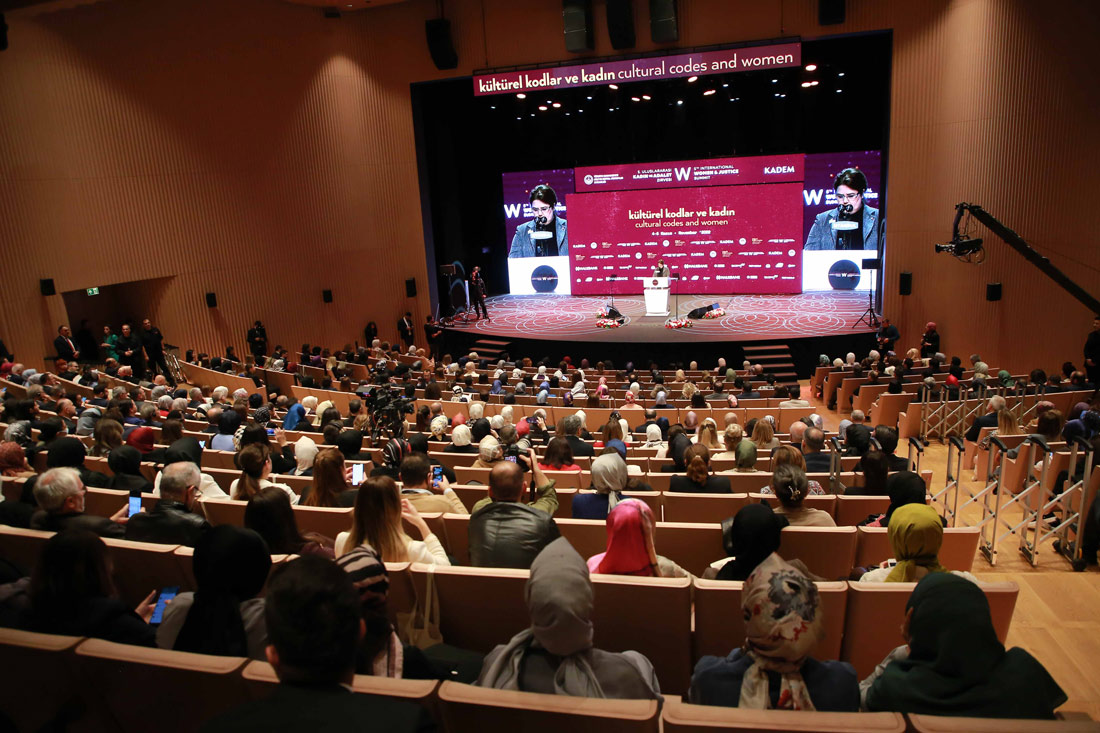
Numerous ministers, academicians, researchers, journalists, and representatives from the business world and civil society organizations from both Türkiye and various countries of the world participated in the summit that took place in İstanbul Atatürk Cultural Center.
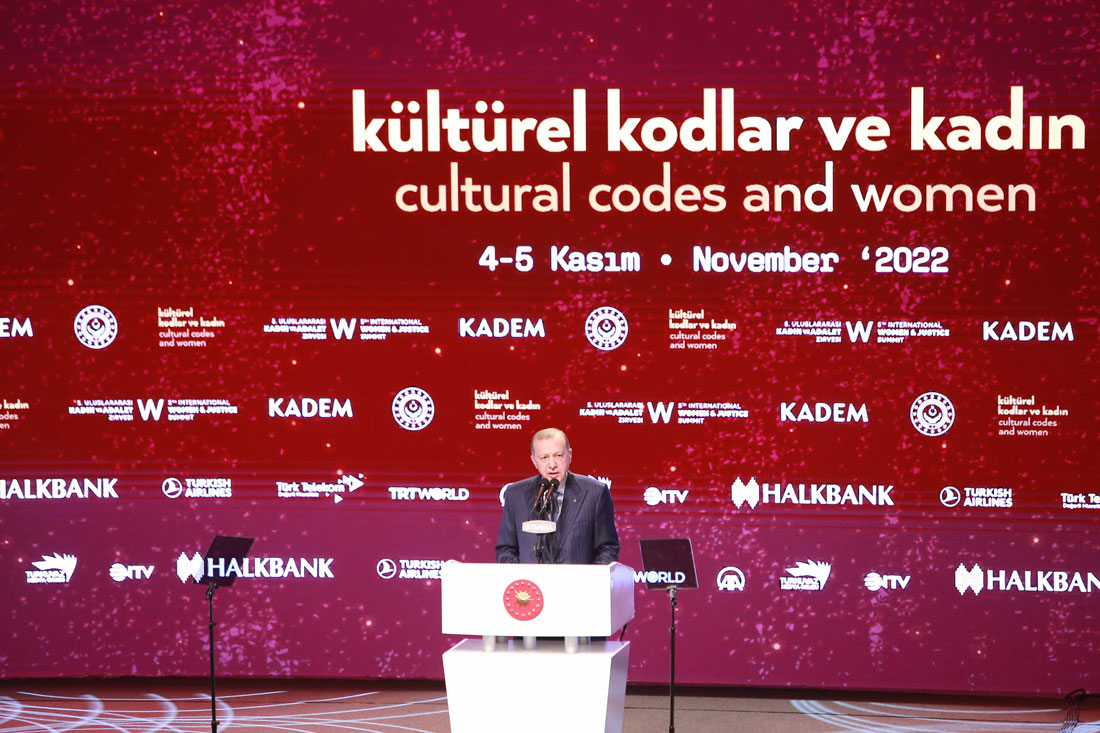
President Recep Tayyip Erdoğan said in his opening speech, “The perception of women shaped by cultural codes and manifesting differently in different societies and regions of the world provides a solid diversity that deserves to be elaborated thoroughly. We observe that one of the most important elements that shape the language, discourse, and practice of women’s movements is these cultural codes. The monotony arising as a result of the global-scale expansion of communication opportunities in a manner open to manipulation has eliminated the richness in the background of the perception of women in various cultures. The dominant character of the Western civilization has shown itself the most in the view on women and assumptions as regards her position in life.”
President Erdoğan emphasized that a single model of women is imposed on societies in every part of the world, women are required to adopt and play the same political, social, cultural, and economic roles. He added, “As we always say, a world where women are excluded is a world that abandoned half of humanity. This is a mentality against both human nature, our faith, and the very working of life. Those who sever the ties between women and the fundamental elements of existence, family in particular, and bring women alongside deviant movements actually harm our women the most. We believe that it is not possible to obtain outcomes for the good of humanity or make these sustainable wherever women are excluded.”
Reminding that the government continues to resolutely implement policies that will empower women, Erdoğan said, “We had promised our nation to tackle violence against women in the most efficient manner long before we came to power. Thus, in 2005, we realized the legal arrangements that were one of the biggest reforms in our history. By greatly aggravating the penalties for crimes that went down in our history as honor killings, we have largely removed this issue from our agenda. Regarding women, we have taken crucial steps by increasing the penalties for domestic violence and violence against women, defining the crime of sexual assault, and mandating that gender differences cannot justify low wages and termination of employment contracts. We expanded the scope of the impact of our efforts by improving the conditions of working women and their rights such as maternity leave and breastfeeding leave. We have initiated practices that protect, watch for, and financially support mothers at every stage from pregnancy to birth and the growth of the child. Those who benefit the most from our services for the disabled and the elderly are our women that are within the scope of those services themselves and take care of the disabled and the elderly. Without a doubt, Law No. 6284 on the Protection of the Family and the Prevention of Violence Against Women that we enacted in 2012 is another important reform in this regard. With the last judicial package of laws, we expanded the scope of crimes against spouses to include the divorced spouse.”
Expressing that women are among the largest group of victims of the hostility toward pious people which was once felt intensely in Turkey, Erdoğan said that it was yet another monstrosity that these persecutions against women which included creating obstacles for their education, refusing them the right to work, and excluding them from the public life were all perpetrated in the name of modernity.
Stating that the idea “What will they do at the university? What will they do at school?” was common and women were deemed worthy of only working on the farms, cleaning, washing urinals, sweeping here, and scrubbing there, Erdoğan said this was Türkiye’s everyday reality for years.
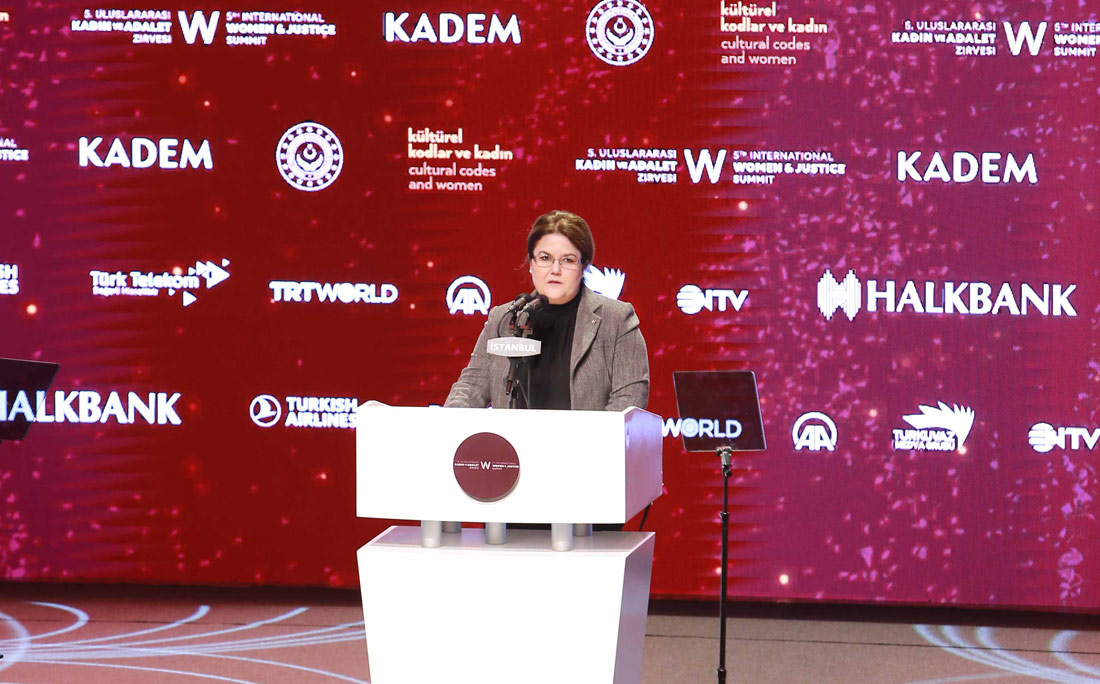
Speaking at the opening ceremony, the Minister of Family and Social Services Derya Yanık emphasized that women’s rights are indispensable, inalienable, and non-deferrable in the context of human rights. She said that one of their primary goals in works targeting women is to ensure that women benefit equally from rights and opportunities in all areas of life.
Minister Yanık stated that among the most substantial topics for the ministry are women’s individual and social empowerment, more qualified education opportunities for women, their taking of a more active part in decision-making mechanisms, and creating more added value in the economy by increasing women’s employment in the labor market and the number of women entrepreneurs.
Drawing attention to the fact that today, especially urban women are expected to be a businessperson with a career, a well-groomed wife, and a dedicated mother, Minister Derya Yanık said, “In order to meet this expectation, women work at a pace beyond what they can bear and face injustices in the work-responsibility balance. At this point, for a fair and livable future, it is imperative to make arrangements to facilitate women’s professional life and to direct family members to share responsibilities. Within this scope, we, as Türkiye, intensify our efforts for the empowerment of women and girls, and strive to remove the obstacles in the way of women who have the courage of their convictions, regardless of their culture, age and profession, whether they are practicing their profession or not.”
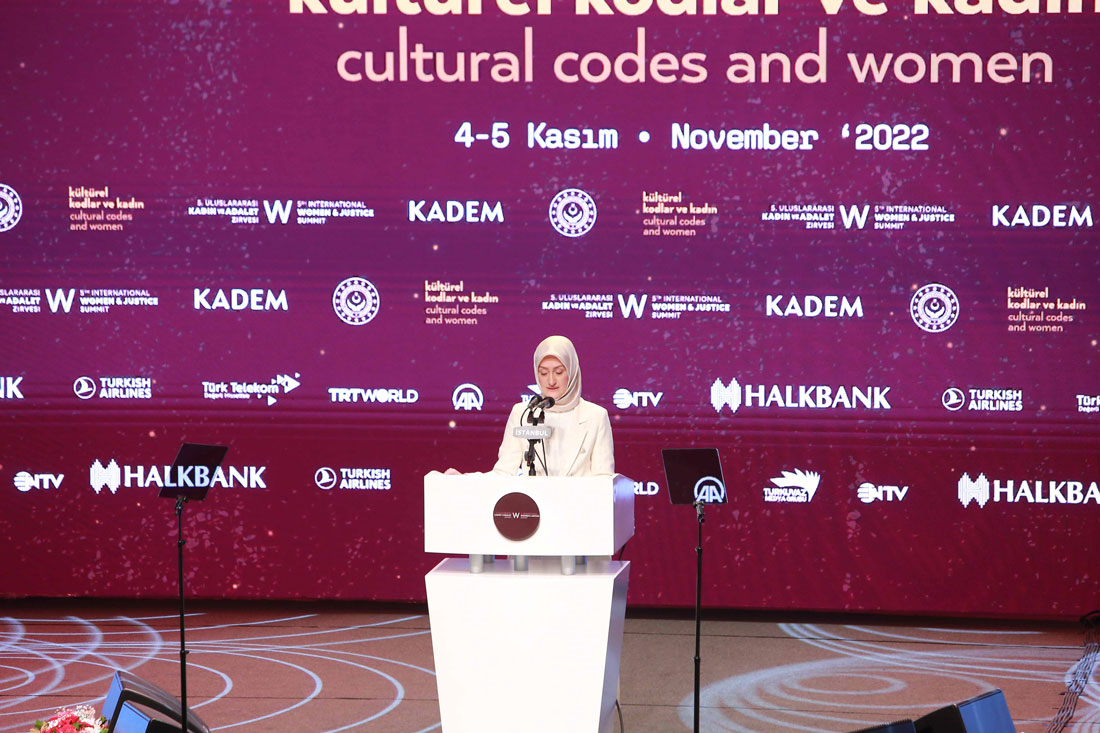
Highlighting in her opening speech the significance of women’s equal use of opportunities in social life, KADEM President Dr. Saliha Okur Gümrükçüoğlu mentioned that they would discuss the impact of cultural codes on women and society at the summit.
Talking about the reason behind this year’s theme “Cultural Codes and Women”, Gümrükçüoğlu said, “We first wanted to bring some fundamental questions up for discussion by choosing this theme for this year’s summit. How are perceptions of femininity formed in different cultures and what purpose do they serve? How do the norms of femininity, which affect the present and future of women negatively, are formed? What kind of life skills do women develop against discriminatory norms and with which methods do they survive? At our summit, we will seek answers to these questions and many others. I hope that the summit, which is a multicultural discussion platform, will also pave the way for new discussions on the topic.”
KADEM President continued her speech as follows:
“Unfortunately, both in the East and the West, cultural codes and practices are mostly not in favor of women. Fortunately, in today’s Türkiye, practices such as honor killings, bride exchange, and betrothal in the cradle are on the verge of disappearing.
However, in some regions, early marriages starting even at the age of 13, girls’ education being shorter than boys, and girls being behind in social life and sports are some of the practices disturbing the equality of opportunity…
Women earning less than men, in both private and public sectors, although they do the same job as is the case in many European countries, women suffering financial loss during pregnancy, birth, and breastfeeding periods in many countries, and women being refused entry to places of worship in some parts of the world are only some of these examples…
On the other hand, we come across different codes and new definitions of femininity determined by the globalizing culture. “Beauty standards” and “perfection”, the cruelest impositions of this new culture, also target women the most. Today, modern urban women are expected to always be beautiful, slim, and flawless. For example, there are many women in South Korea who are not hired because they do not meet beauty standards. Women are even forced to undergo plastic surgery for this very reason.
Global femininity ideals, in fact, standardize, suppress, and make women dependent by telling women how to behave, look, and live. In this case, the first question we should ask is: Well, bombarded with all these imposed definitions of ideal femininity, how will a woman preserve her nature, differences, authenticity, and freedom? For instance, while the role of urban women in traditional societies was limited to housekeeping and taking care of their husbands and children, the urban women of today are expected to be educated, work, and earn money besides these roles. Although the duties and responsibilities of women have increased both in the family and in social life over time, we see that unfortunately responsibilities are not shared fairly between men and women when it comes to sharing responsibility.”
After the opening speeches, President Erdoğan, First Lady Emine Erdoğan, summit speakers, and KADEM Board Members had a family photo together.
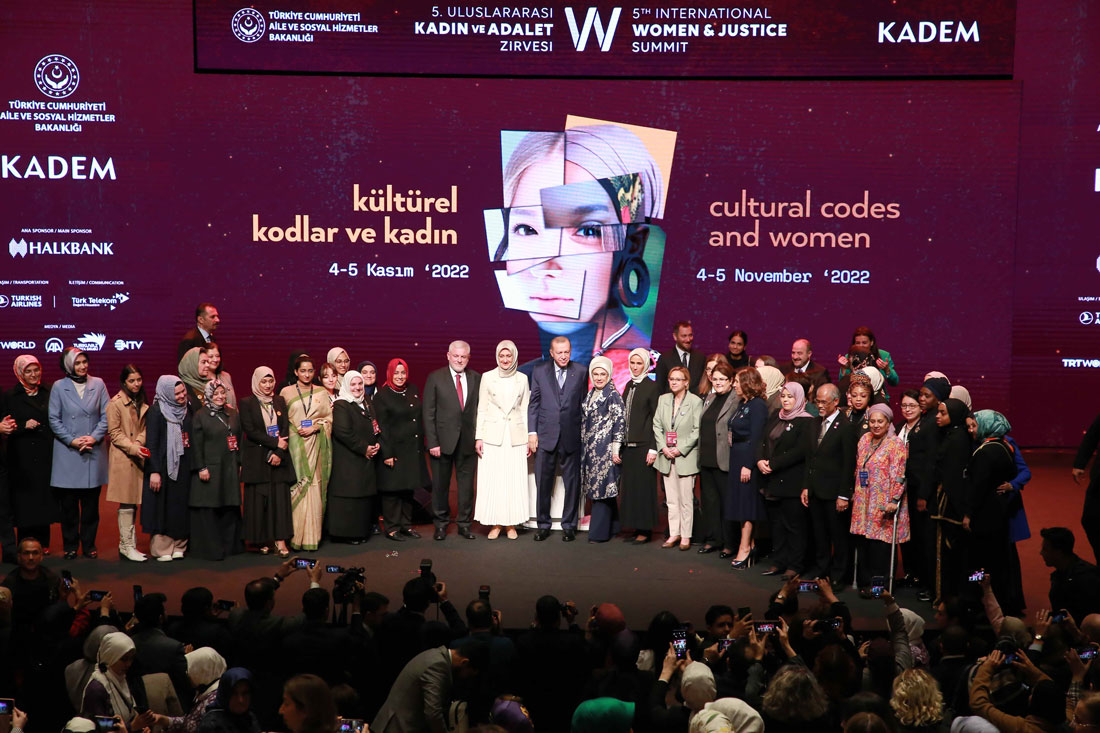
After the opening, the leaders’ panel was held. Speakers of the leaders’ panel moderated by UN Women, Regional Director for Europe and Central Asia and Representative to Turkey Alia El-Yassir were as follows: Minister of Family and Social Services of the Republic of Türkiye Derya Yanık, Chairperson of the State Committee for Family, Women and Children Affairs of Republic of Azerbaijan Bahar Muradova, Algerian Minister of National Solidarity, Family and Women’s Condition Kaoutar Krikou, Minister of Social Affairs of Libya Wafaa Abu Bakr Muhammad Al-Kilani, Palestinian Minister of Women’s Affairs Amal Hamad, Singaporean Minister of Social and Family Development Masagos Zulkifli.
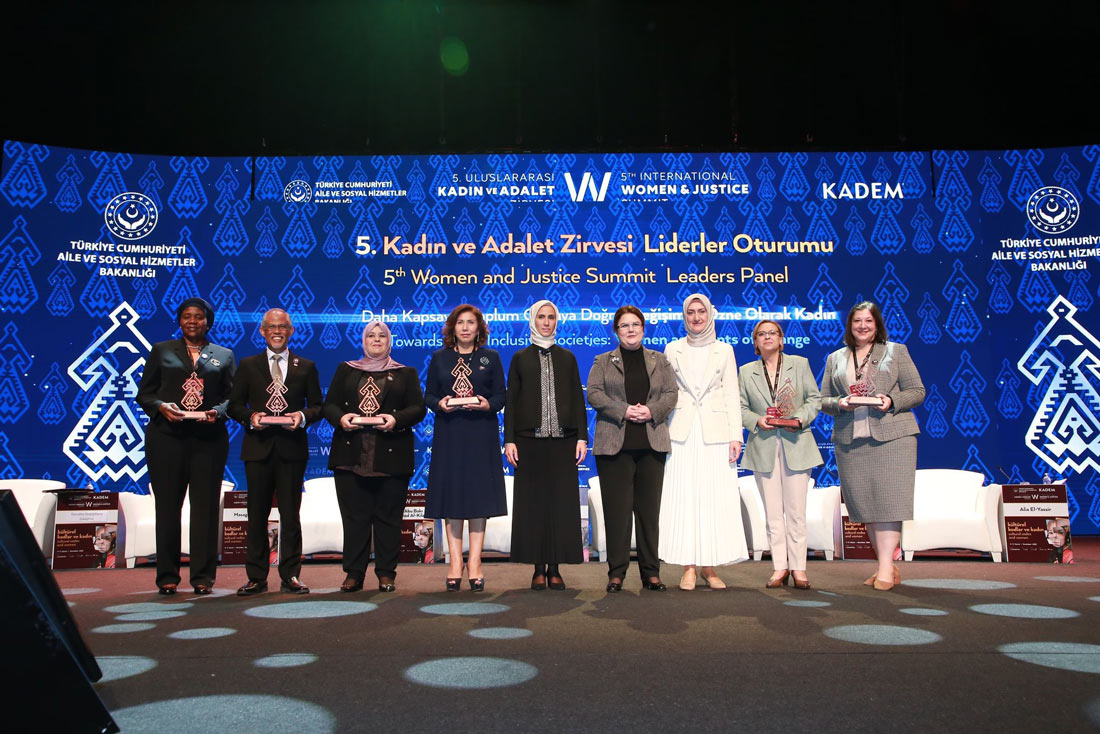
Ministers who participated in the leaders’ panel themed “Towards More Inclusive Societies: Women as Agents of Change” talked about women’s problems in their countries and their work. They summarized the regional and global effects of cultures on women’s problems.
Palestinian Minister of Women’s Affairs Amal Hamad said at the Leaders’ Panel of the 5th International Women and Justice Summit, “Women play an important role in creating a more equal world. Getting rid of the harmful norms that isolate women from society can only be possible with a determination at the level of leaders and the women’s power.”
Tanzanian Minister for Community Development, Gender, Women, and Special Groups Dorothy Onesphoro Gwajima stated in her speech, “Through our national action plan, we are trying to prevent violence against women and children in addition to strengthening women’s contribution to the economy. We need men’s support also to ensure that women are involved in all kinds of social movements and take part in decision-making. We can remove the social and cultural barriers in front of women only with the support of men. We thus protect not only women but also society.”
Singaporean Minister of Social and Family Development Masagos Zulkifli expressed his views on the topic as follows: “The family is the cornerstone of society, it means a strong society. We have advanced women’s entrepreneurship to a certain level in our country also with the support of employers and unions. We are endeavoring to ensure that the working conditions are flexible and that childcare is not a burden on women. We increased the penalties for violence against women in order to prevent it. We want to teach our children at a young age in our homes to value and respect women. We are also working on how women’s business life should be and which areas they should focus on.”
The second day of the summit
In the talks held in parallel sessions in two separate halls, developments in different fields, successful examples, and ongoing problems and suggested solutions were discussed within the framework of the main theme.
“Woman as Subject”
Moderated by KADEM Board Member Dr. Nursem Keskin Aksay, the first session “Woman as Subject” was attended by Afghan Peace Negotiator and Women’s Rights Activist Fatima Gailani, Ibn Haldun University Lecturer & Executive Director, Jasmine Foundation for Research Dr. Tesnim Khriji Chirchi, and Doha International Family Institute Executive Director Dr. Sharifa Noaman Al-Emadi. Inspiring speeches by the session participants attracted attention.
Afghan Peace Negotiator and Women’s Rights Activist Fatima Gailani remarked, “Afghanistan is currently marked by war and women’s problems. We face many cultural and political barriers. However, the Afghan woman will never give up and will build a new future for themselves.”
Ibn Haldun University Lecturer & Executive Director, Jasmine Foundation for Research Dr. Tesnim Khriji Chirchi said in her speech, “No democracy means no women’s rights. It is essential for women not to isolate themselves. Go and prove your freedom. Only in this way can you gain your rights.”
Doha International Family Institute Executive Director Dr. Sharifa Noaman Al-Emadi, on the other hand, stated, “As women, we just want our rights. What we are already entitled to… There is no research on how women suffer. For example, poverty is much higher in cases where women support families. It is seen that divorced older women are poorer than married older women. Children of single parents suffer more problems…”
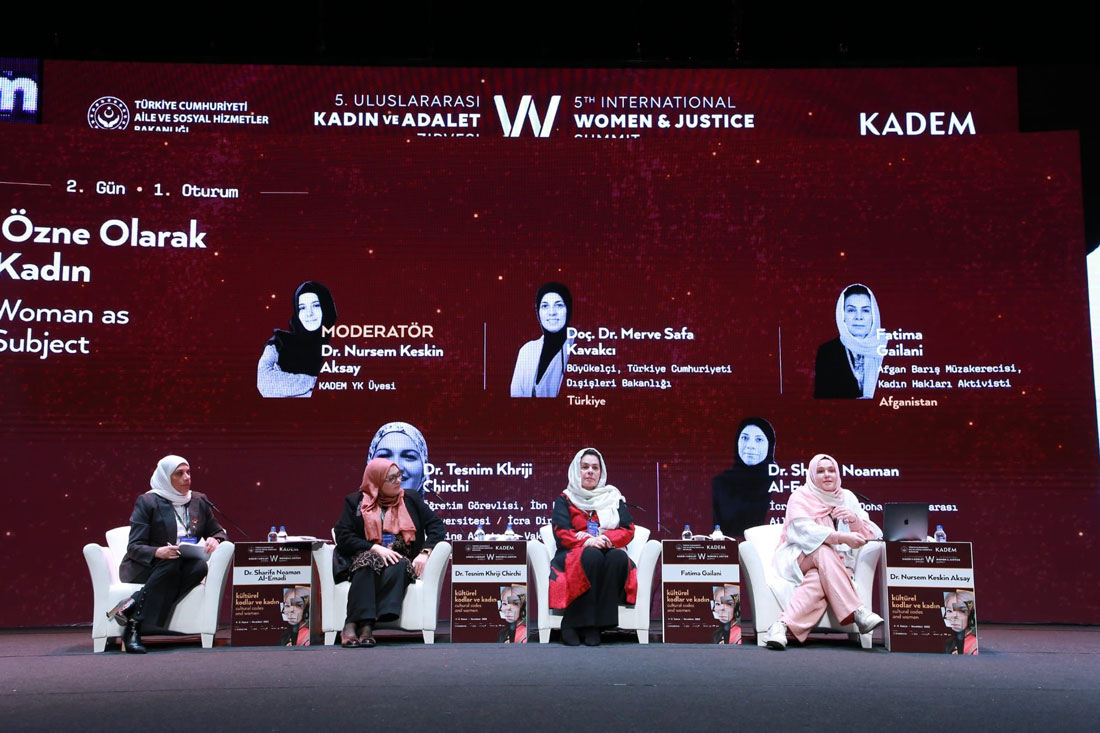
“Women in Public Space and Working Life”
The second sessions were titled “Women at Work” and “Public Space and Market Rules”. Moderated by KADEM Board Member Melek Cevahiroğlu Ömür, the session “Women at Work” hosted LedBy Foundation Founder & CEO Dr. Ruha Shadab, Gürmen Group Board Member Yasemin Gür Solmaz, and Valeurs Ajoutées Magazine Publishing Director Marlyse R. Ndjenga as speakers.
LedBy Foundation Founder & CEO Dr. Ruha Shadab asserted, “When women are not afraid to ask for help whenever they need support, their progress in business life accelerates. Find yourself and don’t be afraid to ask for help.”
Gürmen Group Board Member Yasemin Gür Solmaz argued, “Since labor laws are stricter in Türkiye, women are paid equally to men. This allows for the empowerment of women in working life. Flexible working facilitates women’s participation in business life and promotion in management positions.”
Valeurs Ajoutées Magazine Publishing Director Marlyse R. Ndjenga said, “Women generally choose individuality in the corporate sense. Individuality is important at the beginning, but it won’t be enough when it comes to entrepreneurship. Women should be supported in terms of digitalization. Achieving a work-life balance is also a big gain for women.”
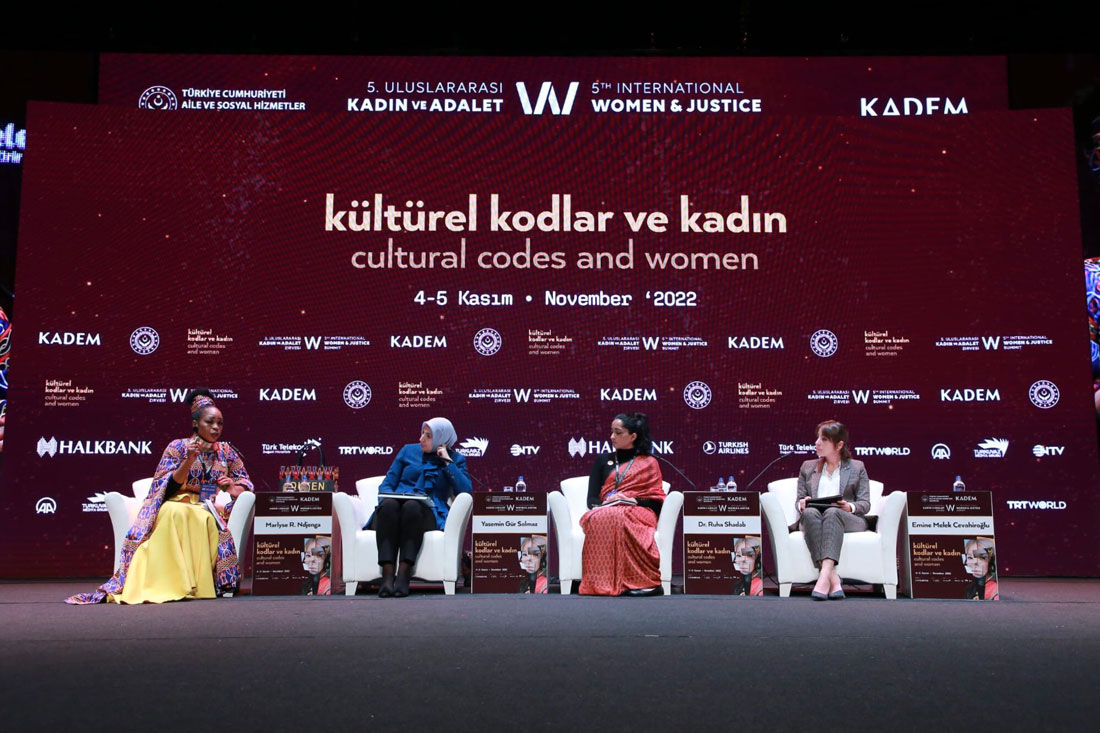
“Public Space and Market Rules”
Moderated by KADEM Board Member Dr. Betül Özel Çiçek, the session “Public Space and Market Rules” was attended by the first hijab-wearing criminal barrister in Britain to be appointed to the Queen’s Counsel and currently serving as the King’s Counsel Sultana Tafadar, World Hijab Day Organization CEO Nazma Khan, Chef and Social Entrepreneur Ebru Baybara Demir, and Award-winning Journalist Rowaida Abdelaziz.
Sultana Tafadar noted, “The UK has laws against discrimination against women; however, they are not enough. What’s more, these laws do not cover hijabi women. It is said that hijabi women cannot be called to the bar or appear in court, otherwise they will be dismissed from the profession. This is against human rights. This discrimination is a violation of the law and freedom of expression.”
Nazma Khan highlighted, “The media is a massive power that determines and directs the world’s view of Muslims and the perception of Islam. It plays a significant role in the discrimination suffered by Muslim women. People should be able to exist and co-exist with their differences.”
Ebru Baybara Demir said, “In eastern culture, sons are much more important as they represent power and the growth of the family. Being a chef is seen as a man’s job and male chefs don’t want women in the kitchen. They try to intimidate them. They, on the other hand, are much more intolerant toward hijabi women. They see the headscarf as an obstacle to being presentable.”
Award-winning Journalist Rowaida Abdelaziz suggested in the panel, “We can eliminate all kinds of discrimination against women through laws and legal regulations. To achieve systematic solutions, women need to be in decision-making mechanisms.”
The last session of the day titled “New Lifestyles and the Construction of Culture” addressed the following topics: “The Visible and Invisible Actors of Modern Times” and “Female Images in Art”.
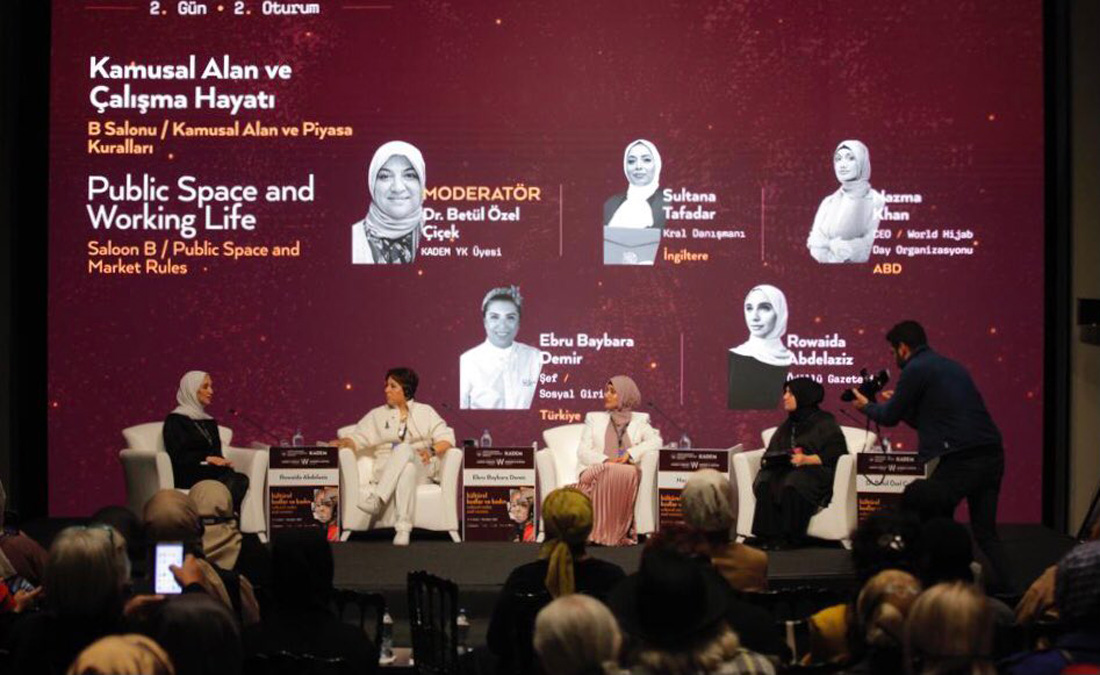
“The Visible and Invisible Actors of Modern Times”
Moderated by TRT Board Member Meryem İlayda Atlas, the panel “The Visible and Invisible Actors of Modern Times” was attended by Athletic Director & International Motivational Speaker Bilqis Abdul-Qaadir, Journalist, Film Maker, and Director of the Centre for Media Monitoring Rizwana Hamid, Award-winning Filmmaker and Activist Waad Al-Kateab, and Actor Reshad Strik.
Athletic Director & International Motivational Speaker Bilqis Abdul-Qaadir said in her speech, “If I should speak for myself, my motivation is to coach young girls. I feel euphoric when I help them make a shot. I believe we demonstrate our strength and we get stronger.” “Any woman who looks a bit different spoils the game – be it in courtrooms or hospitals.”
Director of the Centre for Media Monitoring Rizwana Hamid contributed to the panel with the following words: “The media’s claims that the Muslim woman is not a subject on her own is unacceptable for me. What I have experienced and seen proves the opposite. The media doesn’t show us because we don’t fit the image it is looking for.”
Actor Reshad Strik said, “In places like the Philippines, most women work while men just sit and do nothing. I was bewildered when I saw it.” “I couldn’t believe how strong the Filipino women were.” “The situation was somewhat more balanced in Indonesia. Ghana is a little higher on the list; women were working every day, walking for miles since they were farming and hunting.”
Award-winning Filmmaker and Activist Waad Al-Kateab, on the other hand, said, “Unity is vital. As women, we understand and should understand other women. They are struggling.” “Women currently in Syria are enduring various hardships together with their families. They fight every day. In these wicked times, we should stand with and help each other. We should show our humanity to these people.”
“Female Images in Art”
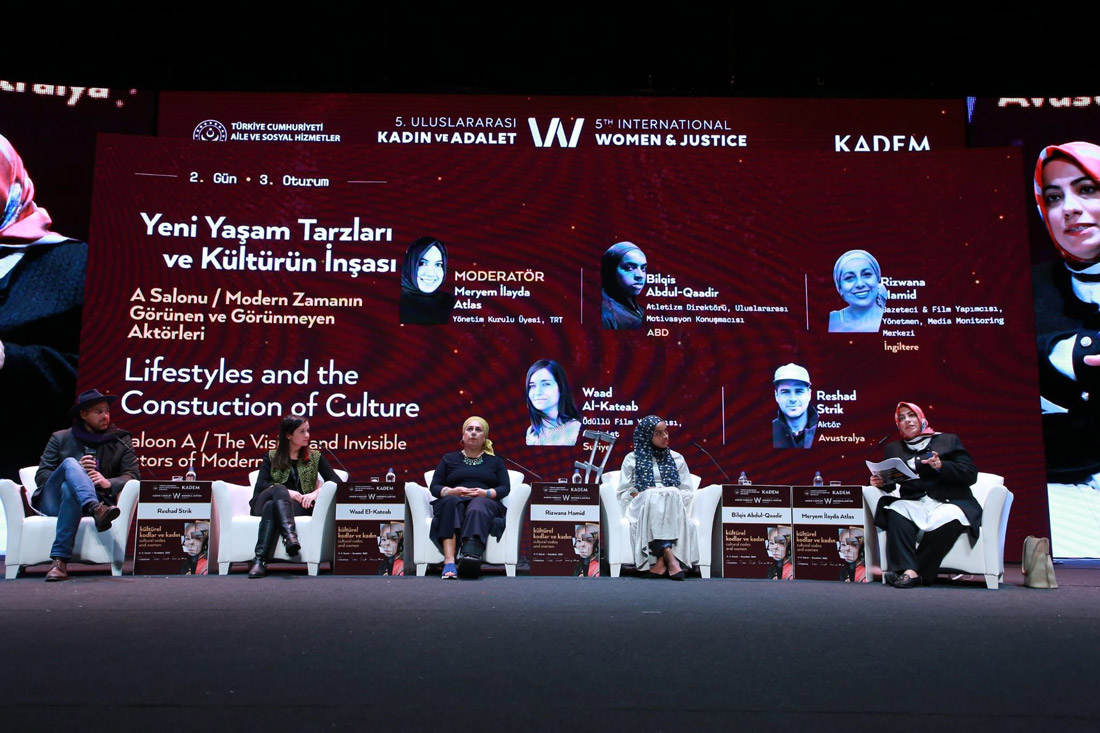
Moderated by KADEM Vice Chairwoman Dr. Sevim Zehra Can Kaya, the panel “Female Images in Art” took place with the participation of Istanbul University- Cerrahpaşa Lecturer Assoc. Prof. Ayşe Taşkent, Historian, Writer, Advisor to the President of Türkiye, Member of Culture and Art Policies Council H. Hümeyra Şahin Oktay, Designer, Cartoonist, Podcaster Ayşe Akova, and Film Director, Producer, and Co-Founder & Producer of Light Art VR Samah Safi Bayazid.
Designer, Cartoonist, and Podcaster Ayşe Akova said at the panel, “The vast majority of graduates of art schools in Germany and France are women. Still, it is men who are in the professional art world and who make profit. Women prefer business life to earn their living and they do art only as a hobby. There is male dominance in the field of art too.”
Istanbul University- Cerrahpaşa Lecturer Assoc. Prof. Ayşe Taşkent emphasized, “Women in the Middle East are not just oppressed women. They are achieving significant successes, especially in the field of art. Women in the Islamic world should not just be dramatized with their traumas; their productions should as well be celebrated.”
Film Director and Producer Samah Safi Bayazid stated, “Islamophobia periodically rises in the US. While Muslims are fighting Islamophobia in the film industry, they are also trying to hold onto our roots. We strive to make viewers feel the Hijra and Masjid al-Aqsa through movies.
We need to tell our own stories and be active in the media.”
Advisor to the President of Türkiye, Member of Culture and Art Policies Council H. Hümeyra Şahin Oktay, on the other hand, said at the panel, “If we look at the influence of women in weaving, we see the emotions enriched by the shapes. In these patterns, women tell their sorrows and joys. In our “Weaving Atlas of Türkiye” project, we uncovered Türkiye’s regional inventory and weaving memory.”
Followed by almost 2000 people from 40 countries for two days, the summit ended with the announcement of the Summit Final Declaration upon the presentation of certificates to speakers at the closing and taking a group photo.
WOMEN AND JUSTICE SUMMIT – FINAL DECLARATION
Distinguished participants,
The 5th Women and Justice Summit organized by the Ministry of Family and Social Services and Women and Democracy Association with the theme of “Cultural Codes and Women” concluded with the presentations of valuable participants.
Ministers and deputy ministers, academicians, researchers, authors, journalists, artists, designers, and civil society representatives from various countries attended our summit, which started with the presence of our Honorable President.
In the ministerial-level leaders’ panel, discriminations experienced by women in different countries due to norm-imposing cultural codes were examined. While the necessity of a strong family for a strong society was underlined, it was emphasized that family responsibilities should be shared fairly by men and women. Arrangements in the legal system and state policies in an attempt to prevent violence against women were evaluated by addressing different dimensions of the issue.
At our summit, issues relating to cultural norms were tackled under the titles “Woman as Subject”, “Women at Work”, “Public Space and Market Rules”, “The Visible and Invisible Actors of Modern Times”, and “Female Images in Art”.
The matters identified at these sessions are as follows:
- The application to all women in the world of standardizing cultural codes regarding womanhood that emerged with modernization is an imposition that should be opposed and objected to. The objection to this imposition does not overlook or ignore the unifying and inclusive aspects of culture but rather facilitates the questioning of norms and codes that lead to injustice, inequality, and discrimination.
- A uniform understanding of modernity is as problematic as a uniform understanding of womanhood. It is seen that the principles imposed on the society in colonized lands clash with local cultures because the absoluteness of standardized approaches determined by modernity cannot act with the local wisdom. Women living in countries with a dominant culture imposed on the society, especially those with a colonial past, face pressure from both the colonizing power and the local cultural codes. It is necessary to be aware of this pressure and develop a civil society approach accordingly.
- Women are compelled to prove themselves in every sphere of life and be more hardworking, more beautiful, and even perfect in order to exist in society. The concept of the ideal woman produced by the media prevents women from choosing their own paths. Women should be provided opportunities where they can protect their authenticity, make their own decisions, and channel their energies and talents to an area of their selection.
- Social tranquility and peace play a great role in the formation of cultural codes. In times of uncertainty, women are the first to be deprived of their rights. The measures to be taken today are of utmost importance in terms of determining the future of women. The position, equality, and education of women at the legal and constitutional levels are vital to eliminating the negative effects caused by war and social unrest. This legal infrastructure establishes a profound protection for women regardless of the stances of governments. Therefore, a constitution that does not deviate from the axis of justice is the guarantee of women’s rights.
- Access to education is highly crucial for women’s empowerment and awareness of their rights. The solution to women’s problems lies in the education of youth and the preservation and strengthening of a more inclusive democracy.
- The family should be approached as a whole with the man and the woman, children and elderly; no family member should be left out. Women’s contribution to their families moves societies forward. The emphasis on the family should not overlook the autonomy of women. Thus, the family should not be defined only as the area of married women or women with kids. When structured from this perspective, social policies will provide more effective results. Scientific studies and collaboration with civil society organizations contribute greatly to the development of such policies.
- In many countries, women suffer discrimination due to their religious beliefs, which is exacerbated by Islamophobia. Discrimination also manifests itself in business life. In order to avoid discrimination, women are obliged to prove that they are better than their other colleagues and to work harder. It is observed that women thus either quit their jobs or are forced to give up on dressing modestly in accordance with their beliefs. It is seen that in such cases, even local legal systems can take decisions restricting universal human rights.
- Women’s empowerment in business life is possible through good education and well-determined priorities. Moreover, receiving support is important for women; they should not refrain from asking for help when they need it. Another matter as essential as the strengthening of solidarity is the development of anti-discrimination policies that will smooth the path for women. Improvements in labor law are also valuable from a structural point of view. Many practices that seem like affirmative action should also be seen as compensation for the rights of which women had been deprived throughout history.
- It is indispensable that women take part in production and decision-making mechanisms. This emerges as a factor that also increases profitability. Women can offer new insights with different perspectives and provide inclusive solutions to problems. Therefore, methods for the facilitation of the adaptation of women to business life should be developed, and flexible working opportunities should be extended. Women should also take more initiative in business life, and they should know that they can get certain jobs that are considered men’s work. The number of role models in business life will thus increase and things will be easier for more women.
- In the recruitment process, women are evaluated in accordance with society’s acceptable female roles rather than their education and merit principles. Recruitment criteria should be reviewed in consideration of equity.
- Women should be provided opportunities in the field of art in all parts of the world. While the number of women educated in arts is on the rise, the number of women active in the art sector does not increase proportionally. Women artists around the globe have similar experiences in this respect. One of the striking proofs of this reality is men being the majority when it comes to winning awards at international art festivals.
- Cartoons especially in Europe and the US indoctrinating Islamophobia along with similar representations in the media reproduce discriminatory cultural codes regarding Muslim women. On the other hand, to provide an alternative discourse, it is critical to bring experiences of discrimination and prejudices up for discussion through the use of humorous devices such as cartoons. Another challenge in this regard faced by women artists is access to physical resources. Supporting them accordingly may enable an increase in the number of Muslim women artists.
- Examples from the history and the Ottoman Empire period demonstrate the existence of women in the field of art in Islamic societies. However, the orientalist perspective renders the influence of women in the field of art invisible by objectifying the female body and deconstructing this continuity. Unfortunately, some contemporary approaches also escalate the victimization of Muslim women by feeding this objectification in art.
